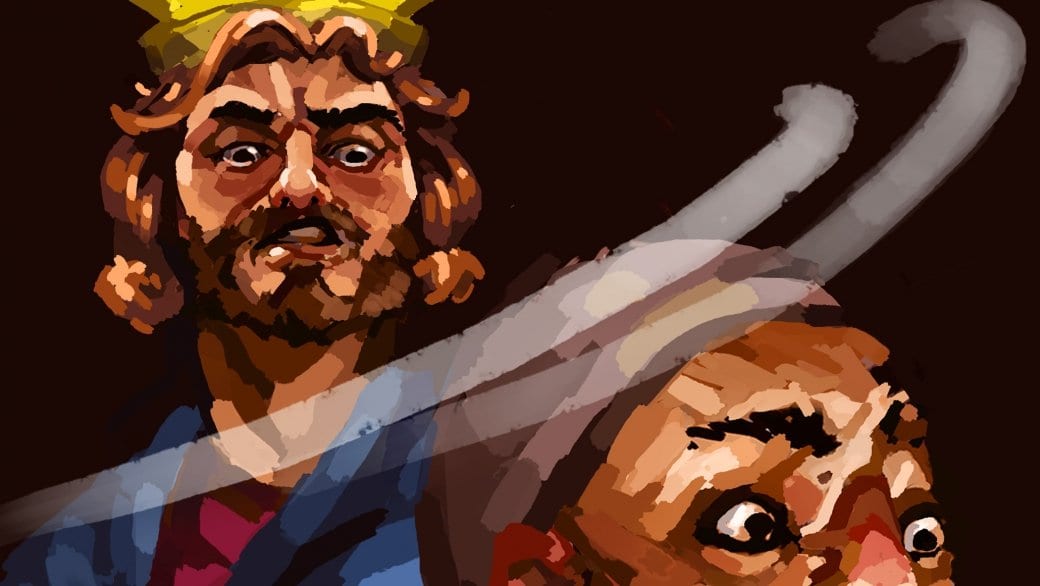In one of the best historical hissy fits I’ve ever read about, King Edward I once snatched the hair from the head of his son, the prince who would eventually succeed him to become King Edward II. Whether the English king took only a clump or perpetrated a veritable wig-snatching, I don’t know, but it’s clear he was more than a little displeased.

(Illustration by Yigi Chang)
Until recently, my knowledge of Edward II was limited mostly to his portrayal in the 1995 movie Braveheart: an ineffectual little ponce who spends his wedding ceremony gazing past his wife and over the shoulder of his father into the smoldering eyes of a well-tanned lad. Later, his father, upset by his son’s mishandling of a military matter, casually tosses the bronze boy-tart out of a window.
Louis Crompton’s Homosexuality and Civilization (2003) and other sources taught me the real story — dispelling such untruths as the defenestration of Edward II’s boyfriend, and adding such delightful details as the hair-pulling session.
Edward II did partake of the love that enters through the butt. By no means the only English king to enjoy a nice, throbbing sceptre, he was certainly one of the least discreet.
Edward II met Piers Gaveston, a Gascon knight’s son, in 1298. Edward I had chosen Gaveston as a safe, suitable friend for his son, but the 14-year-old prince fell hard for his 15- or 16-year-old companion — so hard, that people started to say the prince must be under a spell.
When Edward II gave Gaveston a title traditionally reserved for royalty, it was the last straw. It led to his father unceremoniously separating him from his curly locks and banishing Gaveston.
But when Edward I died a few months later, Edward II, now king, brought Gaveston back and made him Lord Chamberlain and the earl of Cornwall. Angry daddy may have been gone, but the English barons were still there, and they didn’t like Gaveston being raised so high. It didn’t help matters that Gaveston rubbed everyone’s faces in it.
The barons bitched to the king about Gaveston for four years and succeeded in having him exiled two more times. They denounced him as “an open enemy of the King and his people” and when he returned from exile in 1312, they captured him and chopped off his head.
It was all downhill from there (which is really saying something), as Edward II made more and more enemies. His reputation suffered when he lost to the Scottish at Bannockburn in 1314. He also picked two cruel and unpopular advisors, the Hugh Despensers (that’s “the elder Despenser” and his son “the younger Despenser”).
His marriage to the king of France’s daughter Isabel wasn’t going terribly well (surprise surprise). He had married her during his Gaveston infatuation — upsetting her uncles by making come-fuck-me-eyes at Gaveston during her coronation — and it seems unlikely there was any cessation in the boy sex in the intervening years.
Finally, in a move that earned her the nickname “the she-wolf of France,” Isabel rallied forces against her very unpopular husband, imprisoning him and forcing him to hand over the crown to his 15-year-old son.
The Despensers were both killed. It was thought that the younger Despenser was banging the king, so his manner of torture was tailored accordingly: he was made to watch as his own genitals were severed and burned.
Then, in 1327, they killed Edward II by thrusting a hot poker, or some similar object, up his ass. The symbolism of his murder is hardly subtle, but his homosexuality wasn’t something that had been stated in any official way.
It was explicitly stated much later when Edward II’s great-grandson, King Richard II, tried to have him canonized. When faced with the prospect of a cock-sucking saint, many clergy objected, including Thomas de Burton, who, in 1395, wrote “King Edward himself delighted excessively in the vice of sodomy.”
With almost 700 years between us, I can’t decide whether to think of Edward II as brave and unlucky or weak and imprudent. Or something else. But I am happy I finally took the time to learn about this king and his tragic ass.
I also have one more candidate for my own epitaph: “He delighted excessively in the vice of sodomy.” I just hope my persecutors in that far-distant future — robots, aliens and mutants, I assume — are kind enough to forego the symbolic death.
History Boys appears on Daily Xtra on the first and third Tuesday of every month. You can also follow them on Facebook.


 Why you can trust Xtra
Why you can trust Xtra


